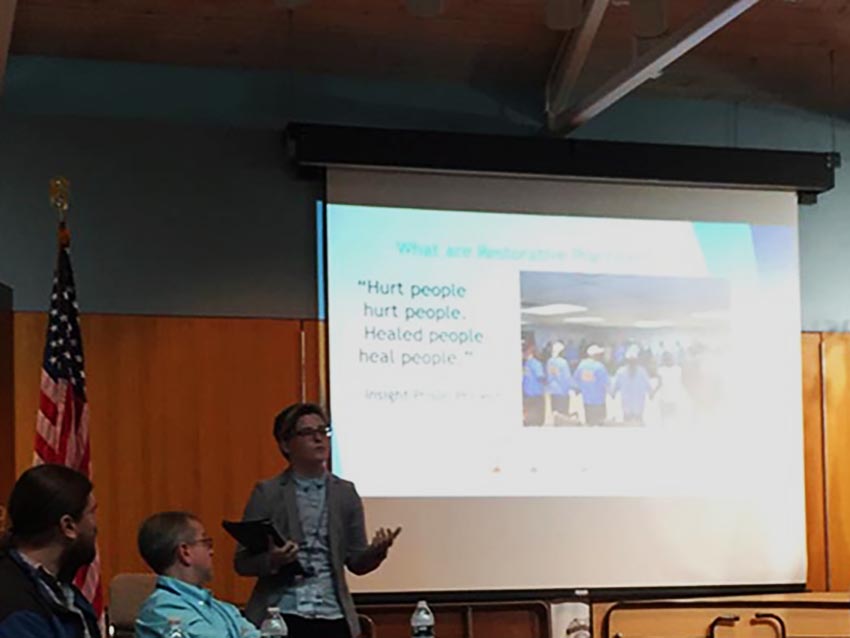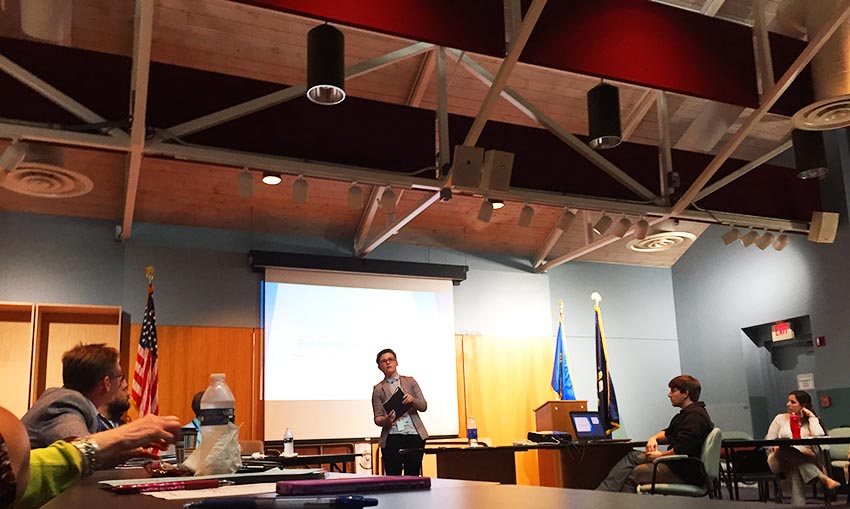
West Jefferson High School is in its first year of using a program designed to resolve conflicts among its students, from the incidental classroom clashes to the gang-like rivalries that spill over onto the Harvey campus.
But already, Assistant Principal John Kulakowski says, “restorative practices approach” has had a “tremendous” effect at the institution. Fewer students are being suspended or expelled, because a newly trained facilitator is guiding warring students and their families to confront their disputes in face-to-face settings called “talking circles” or “community circles.”
The goal is to not only keep students in school and out of the juvenile criminal justice system, but to teach them conflict resolution. In the school setting, it also allows teachers and administrators to tend to other pressing issues instead of being mired in disciplinary actions, Kulakowski said.
“It does work, if done properly,” Kulakowski told the Jefferson Parish Children and Youth Planning Board during its Jan. 26 meeting.
Kulakowski spoke of Restorative Justice, a program implemented in school systems nationally during the past decade as an alternative to simply kicking students with disciplinary problems out of school or having them arrested.
Jefferson Parish Juvenile Court judges began looking at Restorative Justice in 2011, incorporating it into the court’s Families in Need of Services program, said Blake Bascle, deputy chief of the District Attorney’s Office pre-trial diversion program.
A the time, Bascle worked for the Juvenile Court, which extended Restorative Justice practices to Roosevelt Middle School in Kenner, he said. The program migrated with Bascle to the District Attorney’s Office, where DA Paul Connick Jr. authorized Restorative Justice be implemented into the Pre-trial Juvenile Diversion program.
“With Mr. Connick’s support and grant funding support from the Baptist Community Ministries Foundation, the rest is history,” Pam Occhipinti, who has overseen Connick’s diversion program since 2012, said of the spread of Restorative Justice from the courts to juvenile diversion to the public school system.
Pre-trial Juvenile Diversion is a voluntary counseling program done in lieu of prosecution for certain youths between the ages of 10 and 17. If they successfully complete the program, prosecutors can refuse or dismiss the criminal charges.
In the Juvenile Diversion program, Restorative Justice is used in cases involving fights, thefts from a person, destroying another person’s property, assaults and batteries or any incident where “both parties are willing to come together to discuss the harm that was done,” said Michaela Bono, who oversees the Restorative Justice program created more than two years ago.
Youths charged with offenses such as narcotics, inter-family incidents and theft of goods from big chain stores aren’t candidates for Restorative Justice, Bono said. Now, it has spread to the schools.
“Because of Mr. Connick’s willingness to be at the forefront of change, the public school system experienced the positive effects of what we were doing,” Occhipinti said. “They partnered with us to help expand a new approach to conflict resolution.”
Using a variety of grants, the District Attorney’s Office and the Jefferson Parish Public School System began a collaboration last year, training teachers on Restorative Justice practices.
“These are processes that build and restore relationships,” said Lauren Trout, a restorative practices school specialist for the District Attorney’s Office and public school system. “It’s not another program. It’s not something you pull off a shelf.”
In schools, Trout said, students are taught math and other subjects. “And if they don’t know how to behave, we punish them,” she said. And that teaches students what not to do. Restorative practices helps students build relationships while retaining individuals’ dignity.
Gathering in what’s called “restorative circles” or “community conferences,” parties involved in the conflict are brought together to repair the harm caused by a particular incident, Trout said.
“Circles are always voluntary, meaning that everyone that comes to the circle is there because they agree to handle the matter through a community conference,” Trout said. “And its goals are for everyone to have a voice in repairing the harm done by the conflict or incident, and restoring the relationship.
“Rather than ask the questions ‘what rule or law was broken, and how do we punish?’ we are asking ‘what happened, who was affected and how, and what does everyone need to feel better?’” Trout said.
Trained and certified facilitators, such as Trout, plan the circles, where everyone involved or affected by an incident has the opportunity to share their experiences, she said. From there, the parties that include the juveniles’ families, agree on what needs to be done to repair the harm. Trout recalls a case she facilitated at a school where a student made online death threats toward the principal.
“After meeting with the student and his family, and then meeting with the principal, I brought the group together and facilitated a circle in which the student expressed many feelings of isolation and loneliness within the school community, which ultimately led to his actions that got him arrested,” Trout said.
“For the principal, who said she would feel the situation was resolved if the student felt less isolated, repairing the harm from the situation meant not further isolating him from the school community, but rather encouraging him to participate in the school community,” Trout said. “With the help of, and monitored by his parents, the student got involved in a student climate leadership and other after-school activities, and everyone in the circle had their needs met.”
In addition to West Jefferson High School, Alfred Bonnabel Magnet Academy High School and Grace King High School have fully implemented the program schoolwide, she said. Livaudais Middle School will implement the program school-wide in the coming academic year, while John Q. Adams Middle School has trained sixth grade teachers and is building out the program during the next three years, she said.
All of the schools were trained and supported through the Center for Restorative Approaches, a New Orleans-based organization that is working with the Jefferson Parish Public School System, Trout said. The U.S. Education Department’s School Climate Transformation Grant program has funded the work – and pays her salary, she added.
Speaking to the Jefferson Children and Youth Planning Board on Jan. 26, Kulakowski endorsed the program and said more schools should adopt it.
“It’s going to drastically reduce the conflict,” Kulakowski said.


